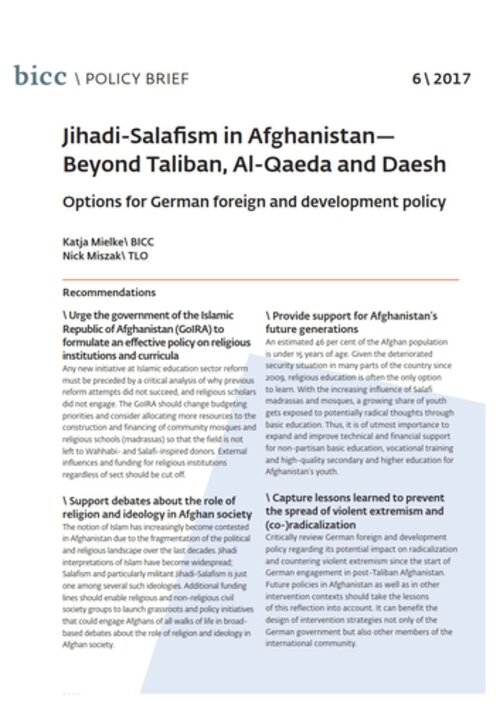Publications
Jihadi-Salafism in Afghanistan—Beyond Taliban, Al-Qaeda and Daesh: Options for German foreign and development policy
Release Date
2017-09
Language
- English
Topics
- –
Since July 2017, the declared liberation of Mosul, Iraq, and the expected fall of Raqqa, Syria, has brought the debate about the survival of so-called Islamic State (Daesh) to the forefront. BICC policy Brief “Jihadi-Salafism in Afghanistan—Beyond Taliban, Al-Qaeda and Daesh” discusses options for German foreign and development policy
The loss of control over territory and people in Iraq and Syria raises the question whether Daesh will dissolve completely or whether it will survive the fall of Mosul and Raqqa. Katja Mielke, author of BICC Brief 6 \ 2017 Brief argues that even if Daesh loses control of Raqqa and Mosul, Jihadi-Salafism will survive as a viable ideology in the Iraqi-Syrian region, but also continue to affect Afghanistan as well as Europe.
The author in particular gives the following recommendations:
\ Urge the government of the Islamic Republic of Afghanistan (GoIRA) to formulate an effective policy on religious institutions and curricula
Any new initiative at Islamic education sector reform must be preceded by a critical analysis of why previous reform attempts did not succeed, and religious scholars did not engage. The GoIRA should change budgeting priorities and consider allocating more resources to the construction and financing of community mosques and religious schools (madrassas) so that the field is not left to Wahhabi- and Salafi-inspired donors. External influences and funding for religious institutions regardless of sect should be cut off.
\ Support debates about the role of religion and ideology in Afghan society
The notion of Islam has increasingly become contested in Afghanistan due to the fragmentation of the political and religious landscape over the last decades. Jihadi interpretations of Islam have become widespread; Salafism and particularly militant Jihadi-Salafism is just one among several such ideologies. Additional funding lines should enable religious and non-religious civil society groups to launch grassroots and policy initiatives that could engage Afghans of all walks of life in broad-based debates about the role of religion and ideology in Afghan society.
\ Provide support for Afghanistan’s future generations
An estimated 46 per cent of the Afghan population is under 15 years of age. Given the deteriorated security situation in many parts of the country since 2009, religious education is often the only option to learn. With the increasing influence of Salafi madrassas and mosques, a growing share of youth gets exposed to potentially radical thoughts through basic education. Thus, it is of utmost importance to expand and improve technical and financial support for non-partisan basic education, vocational training and high-quality secondary and higher education for Afghanistan’s youth.
\ Capture lessons learned to prevent the spread of violent extremism and (co-)radicalization
Critically review German foreign and development policy regarding its potential impact on radicalization and countering violent extremism since the start of German engagement in post-Taliban Afghanistan. Future policies in Afghanistan as well as in other intervention contexts should take the lessons of this reflection into account. It can benefit the design of intervention strategies not only of the German government but also other members of the international community.
PDF-Download
pb_6_17_daesh_web.pdf
[English] (247.51 KB)

Cite as
@techreport{MielkeMiszak2017,
author = "Katja Mielke and Nick Miszak",
title = "Jihadi-Salafism in Afghanistan—Beyond Taliban, Al-Qaeda and Daesh: Options for German foreign and development policy",
latexTitle = "Jihadi-Salafism in Afghanistan—Beyond Taliban, Al-Qaeda and Daesh: Options for German foreign and development policy",
publisher = "BICC",
number = "6",
institution = "BICC",
type = "BICC Policy brief",
year = "2017",
address = "Bonn",
}
Document-Type
BICC Policy brief
Publisher
BICC
Place
Bonn
Countries/Region
Afghanistan



